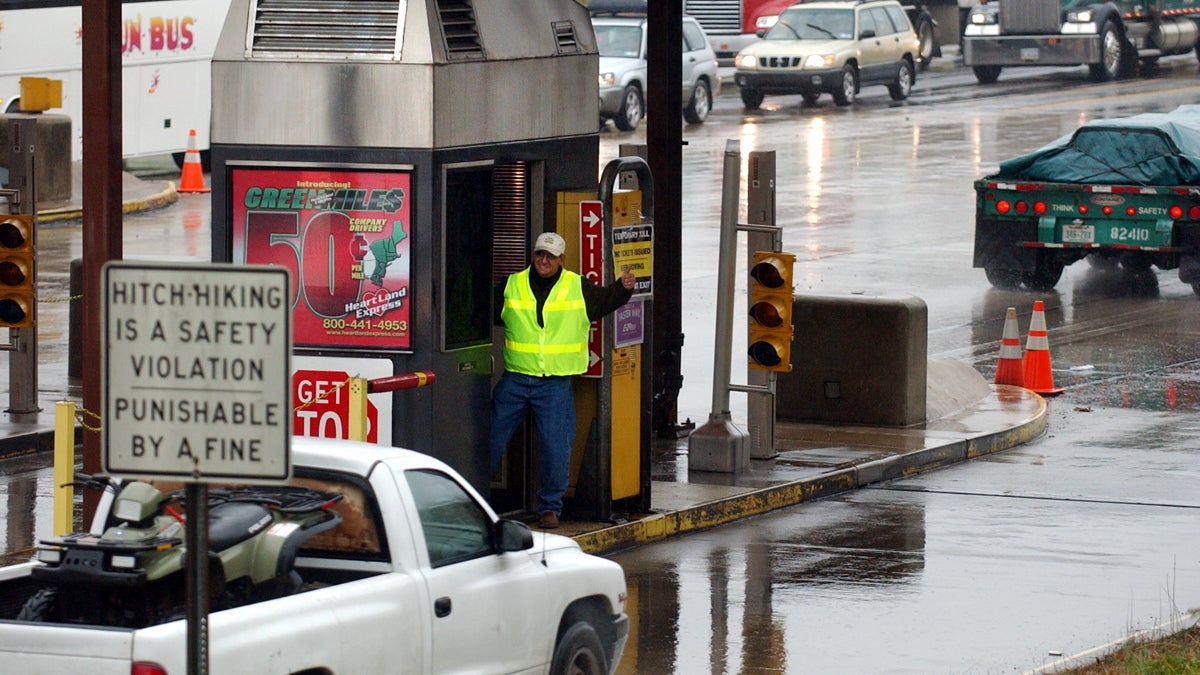Pa. Turnpike to open cashless interchanges, but all-electronic system far down the road

A toll worker gives a motorist a thumbs-up after waving a car past the ticket booth in Carlisle, Pa. (Carolyn Kaster/AP Photo)
The Pennsylvania Turnpike is opening two cashless toll points next year, one in Bucks County, the other north of Pittsburgh.
The pilot programs come just as Turnpike commissioners contemplate going completely electronic, which, officials say, is the way the industry is moving.
Already, 75 percent of Turnpike customers use E-ZPass. It’s around 80 percent among Philadelphia drivers.
But it’s been challenging trying to convince the remaining quarter of drivers to buy in.
The pilot program at the two locations means drivers must have have E-ZPass or have a bill sent to the address connected to the vehicle’s registration. Cash won’t be accepted.
Will abandoning cash lanes become the new norm across the state?
Turnpike spokesman Carl DeFebo said, while the industry is heading toward more electronic tolling, converting the whole 500-plus miles of highway is a long way off. It’s also something that needs more study, he said.
Several tolling agencies have already adopted electronic technology. Among them, operators of a 47-mile road in Denver, one of the lengthiest systems to ditch cash. But that system involved just a fraction of what it would take to bring electronic tolling across the entire state of Pennsylvania.
“There has not been a massive conversion attempted on a toll road system the size of the Pennsylvania Turnpike,” DeFebo said.
The Henry Hudson Bridge in New York City has tried it, too, with mixed success. Drivers have ignored $4 million in toll bills, totaling some $40 million in fees and violations.
Still, Pennsylvania Turnpike officials think an all-electronic system would mean a smoother system with fewer traffic jams.
“We think that this is certainty something worth studying and worth looking at,” DeFebo said. “I can’t really tell you today whether or not we’re going to convert our full system until we’ve been able to look at how these pilot projects are functioning.”
DeFebo said the toll workers stationed at the two pilot programs will be transferred to other locations.
But if the system is adopted statewide, the Turnpike will have no choice but to cut some of its 750 toll collectors.
DeFebo wouldn’t comment on the prospect of toll workers losing their jobs as a result of phasing out cash, saying it’s too early to speculate.
He did say that tolling agencies in other states have found that having a way to stop scofflaws has been “helpful.”
In other words, if someone blows through a toll, a picture of the license plate is taken and a bill is sent to the owner’s home. If it’s not paid, the Turnpike turns the bill over to a collection agency.
If the Turnpike Commission had the authority to strip a driver’s vehicle registration or driver’s license, more unpaid bills might be paid, DeFebo said.
WHYY is your source for fact-based, in-depth journalism and information. As a nonprofit organization, we rely on financial support from readers like you. Please give today.

